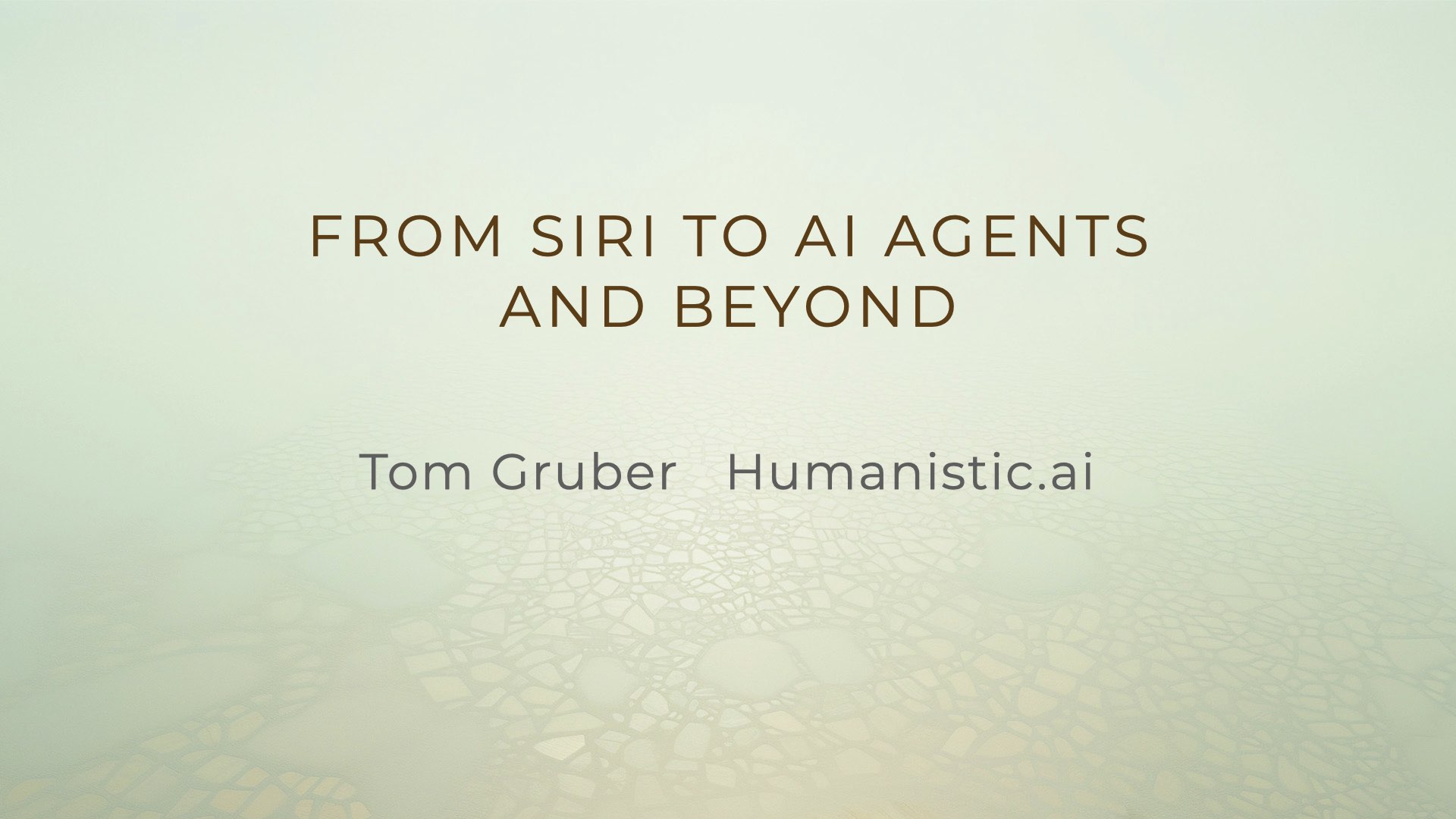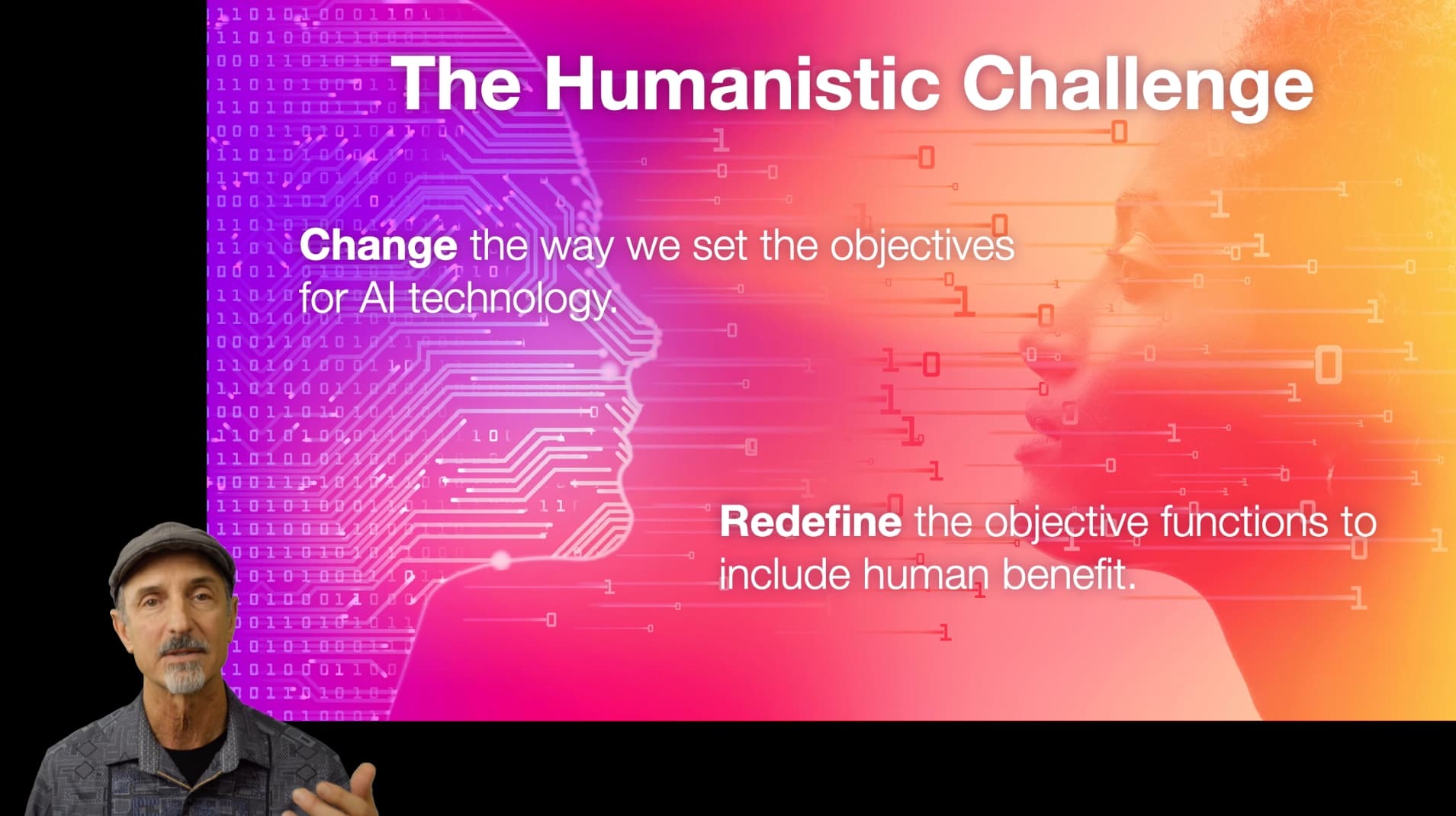Machine Learning
Topics:

Topics:
From Siri to AI Agents and Beyond: Navigating the Near Future with AI

Topics:
AI, Big Data, and Humanity in 2024: Our new relationship with AI

Topics:
What AI and Big Data Can Do for Humanity

Topics:
Acquiring Strategic Knowledge From Experts
Thomas R. Gruber (1988). Acquiring Strategic Knowledge from Experts. International Journal of Man-Machine Studies, Volume 29 , Issue 5 (November 1988), pp. 579-597. Reprinted in The Foundations of Knowledge Acquisition, 1990, pp. 115-133, Academic Press, ISBN:0-12-115922-1.
Abstract: This paper presents an approach to the problem of acquiring strategic knowledge from experts. Strategic knowledge is used to decide what course of action to take, when there are confiicting criteria to satisfy and the effects of actions are not known in advance. We show how strategic knowledge challenges the current approaches to knowledge acquisition: knowledge engineering, interactive tools for experts, and machine learning. We present a knowledge acquisition methodology embodied by an interactive tooi that draws from each approach, automating much of what is currently performed by knowledge engineers, and synthesizing interactive and automatic learning techniques. The technique for eliciting strategic knowledge from experts and transforming it into an executable form addresses the technical problems of operationalization, encoding examples, biasing generalization, and the new terms problem.
Topics:
A Method for Acquiring Strategic Knowledge
Thomas R. Gruber (1989). A Method for Acquiring Strategic Knowledge. Knowledge Acquisition, Volume 1 , Issue 3 (September 1989), pp. 255-277.
Original Abstract: In this article we present an automated method for acquiring strategic knowledge from experts. Strategic knowledge is used by an agent to decide what action to perform next, where actions effect both the agent’s beliefs and the state of the external world. Strategic knowledge underlies expertise in many tasks, yet it is difficult to acquire from experts and is generally treated as an implementation problem. The knowledge acquisition method consists of the design of an operational representation for strategic knowledge, a technique for eliciting it from experts, and an interactive assistant that manages a learning dialog with the expert. The assistant elicits cases of expert-justified strategic decisions and generalizes strategic knowledge with syntactic induction guided by the expert. The knowledge acquisition method derives its power and limitations from the way in which strategic knowledge is represented and applied.
Topics:
The Acquisition of Strategic Knowledge
Thomas R. Gruber (1989). The Acquisition of Strategic Knowledge. San Diego: Academic press, 1989. ISBN:0-12-304754-4.
The PhD thesis turned into a book.
Publisher’s abstract:
The Acquisition of Strategic Knowledge deals with the automation of the acquisition of strategic knowledge and describes a knowledge acquisition program called ASK, which elicits strategic knowledge from domain experts and puts it in operational form. This book explores the dynamics of intelligent systems and how the components of knowledge systems (including a human expert) interact to produce intelligence. Emphasis is placed on how to represent knowledge that experts require to make decisions about actions. The move toward abstract tasks and how tasks are solved are discussed, along with their implications for knowledge acquisition, particularly the acquisition of expert strategies.
This book is comprised of eight chapters and begins with an overview of the knowledge acquisition problem for strategic knowledge, as well as the relevance of strategic knowledge to artificial intelligence. The next chapter describes a dialog session between the ASK knowledge acquisition assistant and the user (“”the expert””). The discussion then turns to software architecture with which to represent strategic knowledge; design and implementation of an assistant for acquiring strategic knowledge; and approaches to knowledge acquisition. Two applications of the ASK system are considered: to evaluate the usability of the elicitation technique with real users and to test the adequacy of the strategy rule representation upon which the approach is dependent. The scope of ASK, its sources of power, and its underlying assumptions are also outlined.
This monograph will be a valuable resource for knowledge systems designers and those interested in artificial intelligence and expert systems.
Topics:
Thomas R. Gruber (1989). Automated Knowledge Acquisition for Strategic Knowledge. Machine Learning, Volume 4 , Issue 3-4 (December 1989), pp. 293 – 336.
Original Abstract: Strategic knowledge is used by an agent to decide what action to perform next, where actions have consequences external to the agent. This article presents a computer-mediated method for acquiring strategic knowledge. The general knowledge acquisition problem and the special difficulties of acquiring strategic knowledge are analyzed in terms of representation mismatch: the difference between the form in which knowledge is available from the world and the form required for knowledge systems. ASK is an interactive knowledge acquisition tool that elicits strategic knowledge from people in the form of justifications for action choices and generates strategy rules that operationalize and generalize the expert’s advice. The basic approach is demonstrated with a human-computer dialog in which ASK acquires strategic knowledge for medical diagnosis and treatment. The rationale for and consequences of specific design decisions in ASK are analyzed, and the scope of applicability and limitations of the approach are assessed. The paper concludes by discussing the contribution of knowledge representation to automated knowledge acquisition.
Topics:
Nature, Nurture, and Knowledge Acquisition
Thomas R. Gruber (2013). Nature, Nurture, and Knowledge Acquisition. International Journal Human-Computer Studies, Vol. 71, Issues 2, February 2013, pp.191-194.
The nature vs. nurture dualism has framed the modern conversation in biology and psychology. There is an analogous distinction for Knowledge Acquisition and Artificial Intelligence. In the context of building intelligent systems, Nature means acquiring knowledge by being programmed or modeled that way. Nurture means acquiring knowledge by machine learning from data and information in the world. This paper develops the nature/nurture analogy in light of the history of Knowledge Acquisition, the current state of the art, and the future of intelligent machines learning from human knowledge.
End of content
End of content